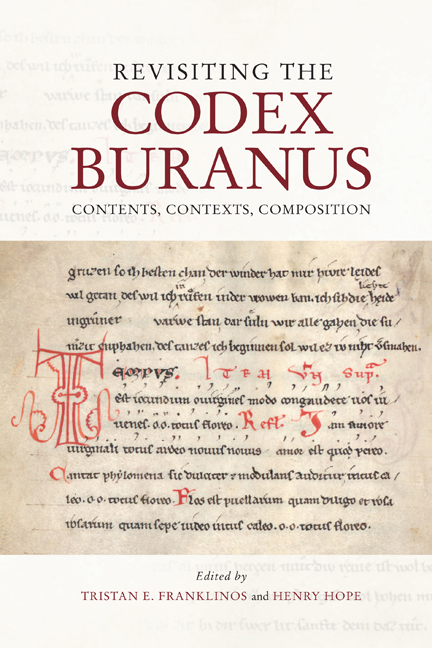Book contents
- Frontmatter
- Contents
- List of Illustrations
- Acknowledgements
- Abbreviations
- Dedication
- Introduction: The Codex Buranus – A Unique Challenge
- Chapter 1 A Modern Reception History of the Codex Buranus in Image and Sound
- Chapter 2 Parody in the Codex Buranus
- Chapter 3 Satire in the Codex Buranus
- Chapter 4 ‘Artes Amatorie Iam Non Instruuntur’: Learned and Erotic Discourse in the Carmina Burana
- Chapter 5 Classical Learning and Audience in the Carmina Amatoria: A Case-Study on CB 92
- Chapter 6 Rape, the Pastourelle, and the Female Voice in CB 185
- Chapter 7 Rethinking the Carmina Burana III: The Poetry of Peasants
- Chapter 8 Predestination and God’s Grace: The Salvific Architecture of the Religious Songs in the Codex Buranus
- Chapter 9 Revisiting the Plays of the Codex Buranus
- Chapter 10 Revisiting the Music of the Codex Buranus
- Chapter 11 Locating the Codex Buranus: Notational Contexts
- Chapter 12 Plurilingualism in the Codex Buranus: An Intercultural Reconsideration
- Chapter 13 Compilation, Contrafacture, Composition: Revisiting the German Texts of the Codex Buranus
- Afterword: multiformis armonia, scolaris symphonia
- List of Manuscripts
- Bibliography
- Index
- General Index
- Studies in Medieval and Renaissance Music
Chapter 9 - Revisiting the Plays of the Codex Buranus
Published online by Cambridge University Press: 16 September 2020
- Frontmatter
- Contents
- List of Illustrations
- Acknowledgements
- Abbreviations
- Dedication
- Introduction: The Codex Buranus – A Unique Challenge
- Chapter 1 A Modern Reception History of the Codex Buranus in Image and Sound
- Chapter 2 Parody in the Codex Buranus
- Chapter 3 Satire in the Codex Buranus
- Chapter 4 ‘Artes Amatorie Iam Non Instruuntur’: Learned and Erotic Discourse in the Carmina Burana
- Chapter 5 Classical Learning and Audience in the Carmina Amatoria: A Case-Study on CB 92
- Chapter 6 Rape, the Pastourelle, and the Female Voice in CB 185
- Chapter 7 Rethinking the Carmina Burana III: The Poetry of Peasants
- Chapter 8 Predestination and God’s Grace: The Salvific Architecture of the Religious Songs in the Codex Buranus
- Chapter 9 Revisiting the Plays of the Codex Buranus
- Chapter 10 Revisiting the Music of the Codex Buranus
- Chapter 11 Locating the Codex Buranus: Notational Contexts
- Chapter 12 Plurilingualism in the Codex Buranus: An Intercultural Reconsideration
- Chapter 13 Compilation, Contrafacture, Composition: Revisiting the German Texts of the Codex Buranus
- Afterword: multiformis armonia, scolaris symphonia
- List of Manuscripts
- Bibliography
- Index
- General Index
- Studies in Medieval and Renaissance Music
Summary
INTERROGATING THE BURANUS PLAYS
Bernhard Bischoff 's critical edition of the Codex Buranus plays, published as part of Hilka/Schumann, is a magnum opus of medieval scholarship. The text of the plays it offers, however, has a number of unsolved editorial problems which have excited the interest of readers and commentators. CB 227 and CB 228 place a number of their chants in odd contexts; CB 26* lacks a rubric and there are questions over whether it should be considered as a standalone play or as a unit with the play that follows (commonly designated as CB 26*a). The present chapter addresses these questions by offering readings of the plays that diverge from the commentary in Bischoff 's critical edition, and suggests that the sequence of scenes in the manuscript does not require radical revision to restore meaning. The conclusion of CB 227 and CB 228, individual passages in CB 15*, CB 16*, and CB 26*, as well as the interpretation of CB 13* as a whole, are the main points to be analysed in this chapter. Previous scholarship is considered with a view to the content-related, formal, and structural aspects of the plays in their specific medieval liturgical settings, as they have been handed down from the eleventh and twelfth centuries.
CB 228
Modern scholars have argued that the concluding chant in CB 228 (The Ludus Rex Egipti) is not in its proper place because its contents do not fit at the end of the play, sitting uneasily with its earlier action. Arguably, however, the chant does belong to the very place where it is found in the manuscript, if it is seen to be sung during the exit of the participants, redeundo. It seems highly likely that this chant held the liturgical function of redeundo since the ‘pueri’ are also assigned songs to enter the stage, eundo. Chants intended to accompany the movement to and from the various loci should not be considered part of the play's dramatic action. Instead, the elaborate chant at the end of CB 228 is to be sung after the ceremony has ended – which is why it is copied into the manuscript without rubrics, as in many comparable cases.
- Type
- Chapter
- Information
- Revisiting the Codex BuranusContents, Contexts, Compositions, pp. 227 - 250Publisher: Boydell & BrewerPrint publication year: 2020



